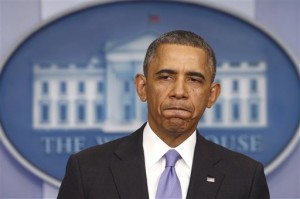WASHINGTON – President Barack Obama hailed an historic interim deal with Iran Saturday as “an important first step” towards a comprehensive accord to end the dangerous showdown over Teheran’s nuclear program short of war.
Obama, speaking at the White House after the deal was clinched between the P5+1 world powers and Iran in Geneva, said the agreement had for the first time in a decade halted progress on Iran’s nuclear program.
But the president also warned that if Iran did not live up to the terms of the deal, the nearly $7 billion in sanctions relief it permits, would be ratched back up and pressure increased.
He also said that he understood that Israel and US allies in the Gulf would be skeptical about the agreement, following their vehement complaints as the negotiations took place.
“Today, the United States — together with our close allies and partners – took an important first step toward a comprehensive solution that addresses our concerns with the Islamic Republic of Iran’s nuclear program,” Obama said in the State Dining Room of the White House.
“While today’s announcement is just a first step, it achieves a great deal.
“For the first time in nearly a decade, we have halted the progress of the Iranian nuclear program, and key parts of the program will be rolled back.”
Senior US officials said the deal did not “recognize” Iran’s right to enrich uranium, and committed Tehran to take a number of steps to halt progress on its nuclear program.
These include, according to a White House fact sheet:
— A commitment to halt enrichment of uranium above five percent and to neutralize a stockpile of 20 percent enriched uranium.
— A commitment not to install additional centrifuges or to use any of its new generation centrifuges. Iran also agreed to leave inoperable roughly half of installed centrifuges at the Natanz plant and three-quarters of installed centrifuges at Fordow, so they cannot be used in enrichment.
— Tehran also agreed to not commission its Arak reactor — designed to eventually produce plutonium that could be used in a nuclear bomb, and to take other steps to halt construction on the plant.
In return, world powers, including the United States, Russia, China, Britain, France and Germany plus the European Union, agreed to a set of reversible measures to ease the sanctions that have choked the Iranian economy.
But Obama stressed that the bulk of sanctions would remain pending a final deal, and that the steps could be quickly reversed if Iran reneged on the terms of the Saturday’s agreement.
“The United States and our friends and allies have agreed to provide Iran modest relief, while continuing to apply our toughest sanctions.
“We will refrain from imposing new sanctions, and we will allow the Iranian government access to a portion of the revenue that they have been denied through sanctions,” Obama said.
“But the broader architecture of sanctions will remain in place and we will continue to enforce them vigorously.
“And if Iran does not fully meet its commitments during this six month phase, we will turn off the relief, and ratchet up the pressure.”
Obama also warned members of Congress planning to impose new sanctions on Iran that such a move could “derail” the progress over the next six months designed at getting a comprehensive deal with Iran.
He also said he recognized that the interim deal reached in Geneva would make some US allies nervous.
“The resolve of the United States will remain firm, as will our commitment to our friends and allies – particularly Israel and our Gulf partners, who have good reason to be skeptical about Iran’s intentions.”
Related story
Iran says next round of nuclear talks ‘difficult’
